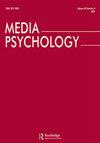误解的四条路径——关于抵制新闻证据的小组研究
IF 2.6
2区 心理学
Q1 COMMUNICATION
引用次数: 3
摘要
摘要公民对气候变化、移民或健康等关键问题的误解被视为当今民主制度中的一个主要问题。大量文献表明,尽管有更正和撤回,但不准确的信息可能会导致误解。这项研究强调了个人对新闻报道的抵制行为是误解的驱动因素。基于抵抗策略的框架,我们研究了四个过程,这些过程使个人能够得出与传统媒体报道的事实不同的政治现实:1)回避证据;2) 对记者专家意见的偏见评价是一种有偏见的处理形式;3) 对证据的内容和来源提出质疑;以及4)通过寻求志同道合的讨论来增强态度。我们应用这个理论模型来解释对政治“伊维萨丑闻”的误解和对奥地利气候变化政策的误解。奥地利选举背景下的两波小组研究结果(N=523)表明,误解部分源于对新闻专家意见的错误推断。此外,对传统媒体进行来源减损的个人能够在相反的证据面前坚持他们的误解。本文章由计算机程序翻译,如有差异,请以英文原文为准。
Four Paths To Misperceptions: A Panel Study On Resistance Against Journalistic Evidence
ABSTRACT Citizens’ misperceptions on critical issues such as climate change, migration, or health are viewed as a major problem in today’s democratic systems. A large body of literature shows how inaccurate information might lead to misperceptions despite of corrections and retractions. This study highlights individuals’ acts of resistance against journalistic reporting as a driver of misperceptions. Based on the framework of resistance strategies, we examine four processes which enable individuals to arrive at political realities that differ from the facts that are reported in the legacy media: 1) avoidance of the evidence; 2) biased evaluation of journalists’ expert opinion as a form of biased processing; 3) contesting the content and source of evidence; and 4) bolstering attitudes by seeking out like-minded discussions. We apply this theoretical model to explain misperceptions on the political “Ibiza scandal” and misperceptions about climate change policies in Austria. Findings from a two-wave panel study in the Austrian election context (N = 523) suggest that misperceptions stem in part from wrong inferences about journalistic expert opinion. Moreover, individuals that engage in source derogation of legacy media are able to uphold their misperceptions in the face of opposing evidence.
求助全文
通过发布文献求助,成功后即可免费获取论文全文。
去求助
来源期刊

Media Psychology
Multiple-
CiteScore
8.60
自引率
7.10%
发文量
30
期刊介绍:
Media Psychology is an interdisciplinary journal devoted to publishing theoretically-oriented empirical research that is at the intersection of psychology and media communication. These topics include media uses, processes, and effects. Such research is already well represented in mainstream journals in psychology and communication, but its publication is dispersed across many sources. Therefore, scholars working on common issues and problems in various disciplines often cannot fully utilize the contributions of kindred spirits in cognate disciplines.
 求助内容:
求助内容: 应助结果提醒方式:
应助结果提醒方式:


